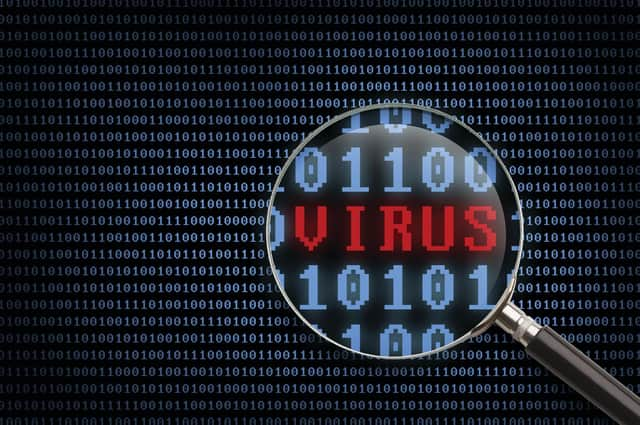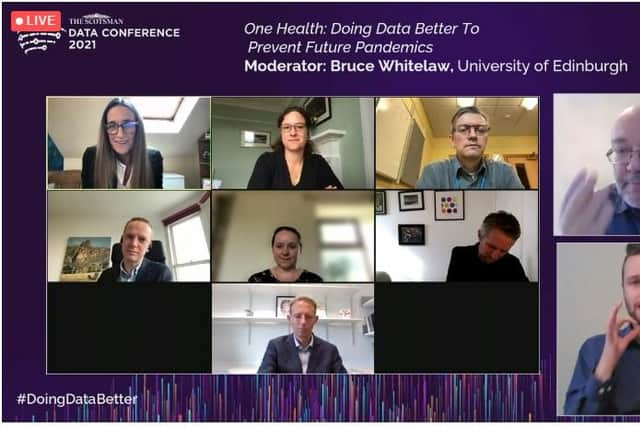Doing Data Better conference: Collaboration now could help us beat future pandemics


A panel, chaired by Professor Bruce Whitelaw, deputy director of the Roslin Institute, part of the University of Edinburgh, heard from seven experts about how data was being deployed in many different ways to improve our understanding of Covid-19 and future pandemics.
Dr Sam Lycett, an expert in genetics, said: “I think we will be able to predict and quantify the risk of having a pandemic [with better data], whether or not we will actually be able to predict the exact time and place. The event itself is very variable, but predicting risky areas and risky situations is possible.”
Advertisement
Hide AdAdvertisement
Hide AdEarlier, Lycett discussed the “colossal amount of viral sequence data gathered during the outbreak” and detailed observations of how viruses accumulate mutations over time.


She said: “This mutation information can be combined with other spatial, epidemiological and phenotypic [data] to infer who infected whom, either at an individual, group or city/region level. Going deeper, we can also estimate predictive factors for why you see [certain] transmission patterns.”
Dr Kenny Baillie, a senior clinical research fellow, said viral sequence data was “converging with huge amounts of clinical and biological data from humans that we’ve gathered from a variety of different research studies in the Edinburgh Parallel Computing Centre”.
This data analysis platform contained 750,000 genomes from viruses, genetic data from 15,000 critically ill humans, and clinical data from more than 200,000 hospitalised patients.
“By converging all that data in the same place, we open up a range of research possibilities,” he said. “My main interest is host genetics – trying to use genetics as a ‘trick’ to cut through the complexity of the human immune system.
“With Covid, the immune system itself is what’s damaging the patient’s lungs and ultimately causing them to die. We’ve discovered effective treatments during Covid that suppress the immune system [but] picking those treatments, finding a specific point in that incredibly complex system where treatment will be effective, is very difficult; we need to switch off the damaging parts and keep the useful parts of the system that defend us against bugs.”
The world’s largest study of human genetics of Covid, at the Roslin Institute, had reported 25 genetic associations with critical illness and Covid, many of which led to “promising therapeutic avenues”, said Baillie.
“We discovered two genes that have led directly to treatments being included in large-scale clinical trials and will soon find out if those treatments are effective,” he said. “We did this in five months, which was incredibly quick but tens of thousands of people died during that time. With computing power and human resources, we hope in future that we can prevent that and move towards close to real-time data, helping us prioritise treatments much more quickly.”
Advertisement
Hide AdAdvertisement
Hide AdIn terms of future data benefits, Baillie said: “Every outbreak that’s caused serious concern over my career has been first detected by an astute clinician seeing several cases in an intensive care unit. We need to establish clinical data collection across many intensive care units across the world, so we can pick it up straight away.”
The discussion also covered zoonosis, the transmission of disease from humans to animals, and OneHealth, the convergence of human and animal health and environmental factors.
Virologist Christine Tait-Burkard described the Roslin Institute’s role in a global consortium looking at coronaviruses in livestock, wildlife and humans. The aim was to “find commonalities and take all the datasets together and find the protein pathways important for all coronaviruses so we can get drugs for any future pandemic”.
She added: “We know for coronavirus, antiviral drugs are a bit too late when people are already in hospital. So we really need that easy drug, a pill that people can take at home when they get the first symptoms.”
Professor Ross Fitzgerald, director of Edinburgh Infectious Diseases, said antimicrobial resistance (AMR) was a huge public health threat, with estimates suggesting hundreds of thousands of deaths occur worldwide due to infections caused by resistant bacteria.
“This is unevenly distributed across the world, with the majority of infections in the developing world, where the situation is getting worse,” he said.
“We’re running out of effective antibiotics, and need to tackle this in a joined-up way around the world. Otherwise we’ll reach a situation where common medical procedures [including routine surgeries and chemotherapy] are considered too dangerous, because of the absence of effective antibiotics for preventing infections that may occur around those procedures.
“A lot of what we can do is related to data. We need more rapid effective diagnostics to inform effective treatments, more sequence information around clinical and environmental samples to allow us to identify resistant pathogens and to understand how resistant strains emerge and spread.
Advertisement
Hide AdAdvertisement
Hide Ad“We need to unite academia, industry, government and policymakers so we’re all working together, communicating the data effectively to urgently address the impact of AMR. More high-quality data would allow us to track spread of resistant pathogens.”
Professor David Dockrell, a clinician scientist studying immune responses to pathogens in humans, said: “There’s a very wide range of pathogens, which can and do cause zoonosis and it’s not just about the pathogens themselves it’s about the resistance traits
“We know they have major impacts. They have caused pandemics and altered human history, as we’ve seen with HIV, influenza pandemics and Covid-19. We need data to help us predict and protect, and know more about the range of pathogens and their hosts. From the human perspective, we want to understand transmission and consequences.”
Bruce Whitelaw said the session highlighted the vital need for “different actors to work together, both locally and globally” to harness the power of data to make the fight against future pandemics more effective.
Edinburgh has a central role to play because of its strength in computing, particularly data storage and access, as well as data innovation and human and animal health expertise.
“We have the talent, connections and partnerships – and need to have these partnerships across academia, society, and the commercial sector, but also internationally,” Whitelaw said.
He also quoted veterinary specialist Professor Lisa Boden, of the University of Edinburgh, who said that we had to “bring together disparate communities to address the grand challenges facing us; that’s what we can do with data, and with OneHealth.”
A digital version of the full conference report can be found here.